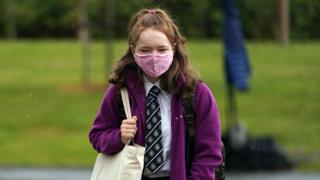
Secondary schools in Scotland may ask pupils to wear face coverings between lessons.
What are the rules for schools elsewhere in the UK? And what should you do in shops and on public transport?
What are the face covering rules in schools?
The use of face coverings in schools is currently voluntary. However, some have started asking staff and pupils to wear them, to help stop the spread of Covid-19.
The Scottish government is expected to say they should be worn in corridors and communal areas, but not classrooms. They are also looking at whether to make them compulsory on school transport.
Asked whether pupils should wear masks in secondary schools, England's deputy chief medical officer Dr Jenny Harries said the evidence is "not strong".
A Number 10 spokesman said pupils in England would not be required to wear face coverings and there were "no plans" to change the guidance.
Face coverings are "strongly encouraged" in NI schools if social distancing is not possible, but are "not generally recommended for routine use".
Wales does not recommend pupils wear face coverings in school.
What about in shops?
Face coverings must be worn in shops, supermarkets and shopping centres in England, Scotland and Northern Ireland - but not Wales.
Those who fail to do so can be fined by the police - up to £100 in England, or £60 in Scotland and Northern Ireland.
Shop workers do not have to wear face coverings.
How about other indoor spaces?
In England and Scotland, face coverings are also compulsory in a number of indoor spaces. These include:
- Banks, building societies and post offices
- Places of worship
- Museums, galleries and entertainment venues
- Libraries and public reading rooms
Face coverings do not have to be worn where it would be ''impractical'' to do so - for instance, restaurants, pubs and gyms.
In Northern Ireland, apart from shops, the rule includes "any other indoor place where goods or services are available to buy or rent... for example, a bookmakers, a food takeaway business or a dry cleaner".
In Wales you are not currently compelled to wear a face covering in shops.
Who doesn't have to wear a face covering?
Some people do not have to wear a face covering. They include:
- Children under 11
- Those unable to put on or wear a face covering because of a physical or mental illness or disability
- People for whom wearing or removing a face covering will cause severe distress
- Anyone assisting someone who relies on lip reading to communicate
You can take off your mask if:
- You need to eat, drink, or take medication
- A police officer or other official asks you to or if shop staff need to verify your age
- You are entering a shop to avoid harm, if you do not have a mask on you
Young children should not wear face masks because of the risk of choking and suffocation.
What are the face covering rules on public transport?
Face coverings are compulsory for anyone travelling by public transport in England, Scotland, Wales and Northern Ireland (unless they have an exemption or a reasonable excuse).
Passengers boarding aircraft in England, Scotland and Wales must wear a face covering - Northern Ireland also recommends their use.
People can be refused travel if they don't follow the rules, and can be fined as a last resort.
Where am I supposed to get a face covering?
The government has been careful to use the term "face covering" rather than "face mask" - with surgical masks kept for medical use.
The BBC has created a guide on how to make your own face covering. The government has issued its own advice too.
Do face coverings work?
World Health Organization (WHO) advice says non-medical face coverings should be worn in public where social distancing is not possible.
Coronavirus is spread when droplets are sprayed into the air when infected people talk, cough or sneeze. Those droplets can then fall on surfaces.
The WHO says there is also emerging evidence of airborne transmission of the virus, with tiny particles hanging in aerosol form in the air.
Homemade cloth face-coverings can help reduce the spread from people who are contagious but have no symptoms or are yet to develop symptoms.
Scientists in Singapore suggest the contagion risk is especially high in the 24-48 hours before an infected person is even aware they might have the disease.
Taking a face covering on and off can also risk contamination, the WHO says.